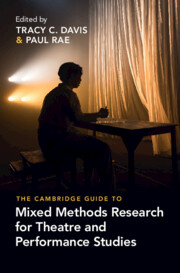Book contents
- The Cambridge Guide to Mixed Methods Research for Theatre and Performance Studies
- Reviews
- The Cambridge Guide to Mixed Methods Research for Theatre and Performance Studies
- Copyright page
- Contents
- Figures
- Tables
- Contributors
- Acknowledgements
- Introduction:
- Part I Planning
- Chapter 1 Methods Dialogue:
- Chapter 2 Planning a Research Project:
- Chapter 3 Interdisciplinary Acts:
- Chapter 4 Mixing Methods in a Multi-Sited, Collaborative Project:
- Chapter 5 Methods Dialogue:
- Part II Doing
- Part III Interpreting
- Index
- References
Chapter 4 - Mixing Methods in a Multi-Sited, Collaborative Project:
Researching Migration, Working with Variation
from Part I - Planning
Published online by Cambridge University Press: 01 February 2024
- The Cambridge Guide to Mixed Methods Research for Theatre and Performance Studies
- Reviews
- The Cambridge Guide to Mixed Methods Research for Theatre and Performance Studies
- Copyright page
- Contents
- Figures
- Tables
- Contributors
- Acknowledgements
- Introduction:
- Part I Planning
- Chapter 1 Methods Dialogue:
- Chapter 2 Planning a Research Project:
- Chapter 3 Interdisciplinary Acts:
- Chapter 4 Mixing Methods in a Multi-Sited, Collaborative Project:
- Chapter 5 Methods Dialogue:
- Part II Doing
- Part III Interpreting
- Index
- References
Summary
This chapter addresses the methodological challenges presented by multi-sited, collaborative research design in TaPS, which provides a fruitful space for considering the benefits of mixed methods approaches. Multi-sited, multi-collaborator research projects frequently feature methodological variation. Whereas mixing methods addresses discrepancies between the different sites and cases that such a project brings together, collaborative research ensures that participants’ rationales for selecting and combining methods remain explicit. Emine Fişek illustrates these processes with reference to a hypothetical research project on theatre and performance practices responding to the European migrant crisis of 2015–16.
Keywords
Information
- Type
- Chapter
- Information
- Publisher: Cambridge University PressPrint publication year: 2024
